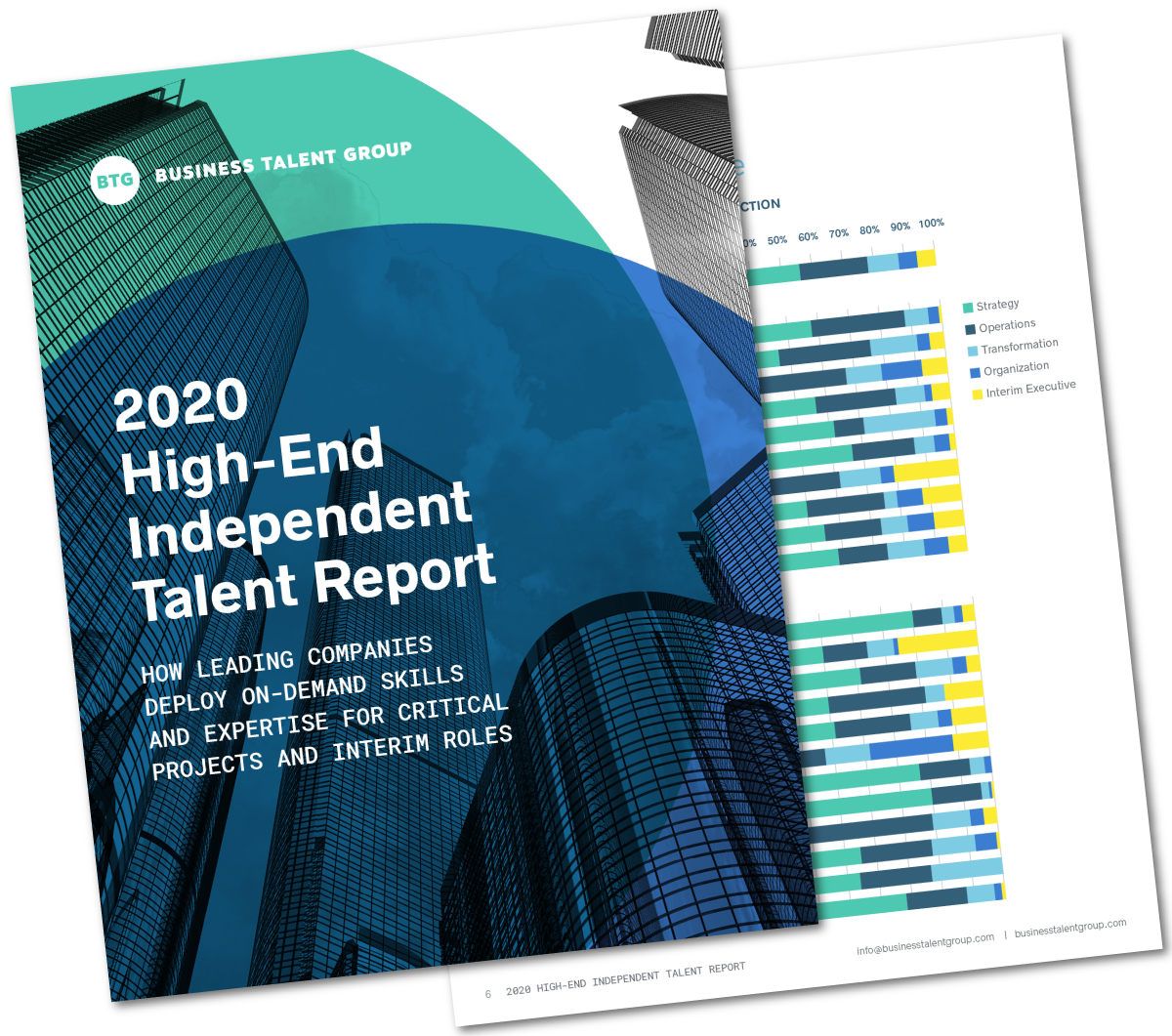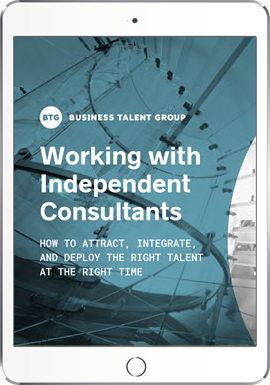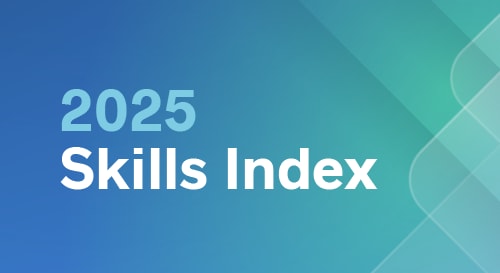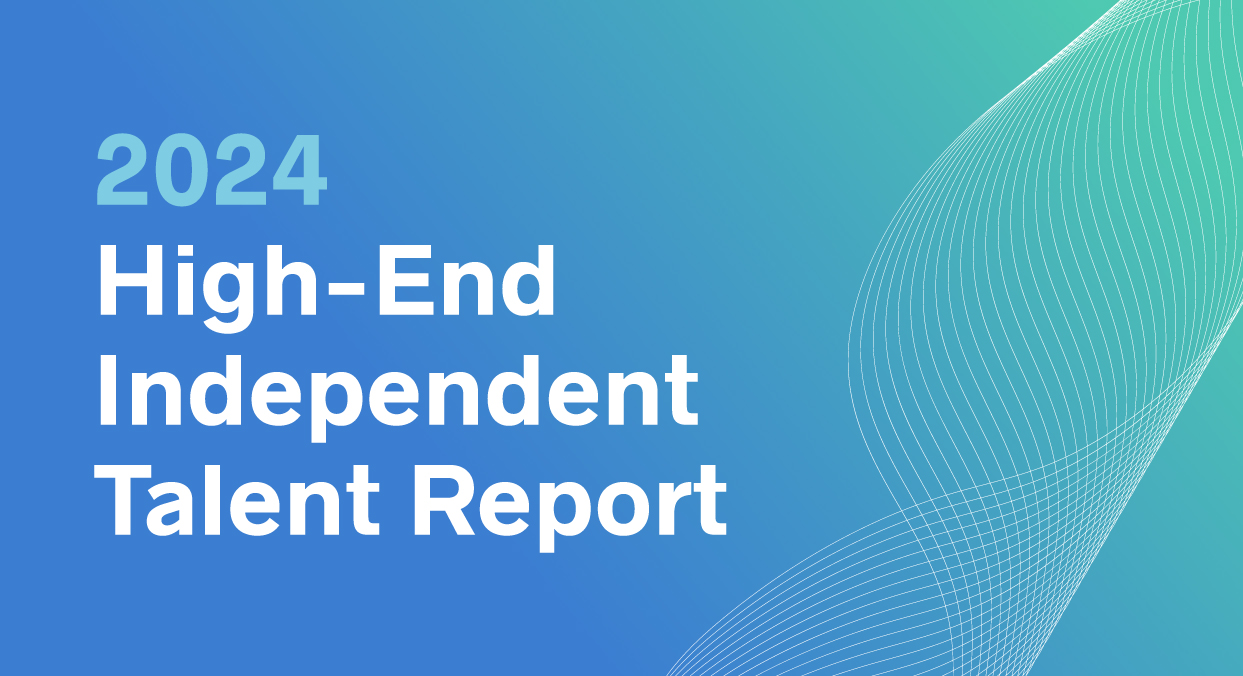
Independent consulting helps companies boost organizational agility, access hard-to-hire skills, and move faster on critical projects.
Unfortunately, there’s still a lot of confusion about exactly what it is—and how executives and HR and procurement leaders can put it to effective use. It goes by a variety of names: freelance consulting, on-demand talent, the gig economy, supertemps, flash organizations, the human cloud, the liquid workforce, and many others.
It also means different things to different people. Some executives view independents as a faster and more flexible alternative to Big 3 consulting firms. Others tap them to access extra skills and capacity in advance of a big deadline. And a growing number of people are simply calling them the future of work.
In this guide, we’ll unpack the trend and help you understand exactly how independent consulting fits in with your company’s structure and goals.
Table of Contents
- Meet the talent: Who are independent consultants?
- Project power: What can independents do for big companies?
- Benefits: Why top executives choose independents
- Maximizing value: How to find, engage, and succeed with independents
- The future of work: Independent consulting by the numbers
Who are independent consultants?

As you might imagine, independent consulting starts with independent consultants. Who are they?
They are people—knowledge workers with advanced degrees, hands-on experience, and cutting-edge skills in almost every industry and field—who want to work differently. They’re not between jobs; in fact, they’re not looking for jobs. Instead, they want to control what they work on and who they work with, rather than committing to a permanent role with a single employer. They’re the so-called supertemps, among the 60% of workers who told TD Ameritrade that the ability to be your own boss is the new American dream.
And their ranks grew by 70% between 2011 and 2018, according to an MBO brief on high-earning independent workers.
Some of the earliest independents of the modern era were creatives: writers, designers, graphic artists, and the like. A second wave grew when the alumni of firms like McKinsey, BCG, and Bain began offering a more targeted set of strategic and analytical services—without the big-firm overhead.
Now, independents come from a broad range of top firms and companies. They don’t necessarily have classical consulting experience, and they don’t need to. Why? Because the work that they’re doing transcends consulting project types like strategy, analysis, and market research (though there’s still plenty of that, too).
But before we get to the work of independent consulting, we’ll make one last point about the people.
From a historical perspective, there’s a sense in which the trend is simply taking us back to the future. “When people were artisans, before corporations, they were all independent professionals,” as Business Talent Group CEO, Jody Greenstone Miller, noted in a conversation with Wharton professor Peter Cappelli and attorney Dan O’Meara on their podcast, In the Workplace. Top talent almost always does better in a free-agent model.
What can independents do for big companies?

The most straightforward options for using independent talent come from the consulting world.
Say you’ve just hired one of the big strategy firms to create a roadmap for the digital transformation that will keep your firm competitive. Do you have the bandwidth to support successful strategy execution? Go it alone and you’ll likely find that trying to manage daily business and implement the strategic plan means that neither gets done effectively. Independent consultants, on the other hand, can assume responsibility for all the temporary activities that relate to implementation and that disappear afterwards. What’s more, the consulting costs will be far lower than the big firm would have charged.
Say you need help exploring an opportunity in an adjacent market but would prefer not to rely on an array of newly minted MBAs to do the work. Say you’ve been asked to update a strategic plan and can’t justify McKinsey’s rates. Or say you’d simply prefer to hand-pick your consulting team or need more targeted expertise than big consulting firms can offer.
But if you work at a big company, it’s not a stretch to say that you’ve probably encountered one of the following situations:
- You’re up against a big deadline, but your team can’t work any harder
- You’re investigating a new opportunity, but you need someone with specific expertise to help validate or extend your analysis
- You’d like to stand up a new business, but you don’t know where it fits in the company
- You’re looking for help in a hard-to-hire area like data science or artificial intelligence
- You need project management support on a critical but temporary initiative
Independents can do all that and more. They can take on big initiatives, fill temporary roles, and oversee significant transitions and transformations. They can tackle projects on demand that range from org design, marketing, and operations to change management and interim leadership.
And they are doing it, in ever greater numbers, at F1000 companies across the globe. Our analysis of the latest independent talent trends reveals that F1000 executives are using independents for everything from business intelligence to business process improvement. Meanwhile, an American Express survey found that 71% of executives expected to increase their use of independents in the future, and 75% of executives said that independent labor would soon be an integral part of their firm’s employment practices.
Why top executives choose independents

From streamlining consulting costs to moving quickly on new opportunities, the reasons executives work with independents are vast and varied. In fact, if you understand the true breadth of independent consulting world, according to one of our clients, “it begins to reshape the way you think about your resourcing and talent strategy and what you do internally and externally to use it to your advantage.”
Here are a few additional perspectives we’ve gathered from our clients:
How to find, engage, and succeed with independents

The independent talent marketplace is filled with people who would be thrilled to work on interesting, impactful projects at your company.
That doesn’t mean they’ll accept whatever you throw at them—or that they’re available at a moment’s notice to work around the clock. To attract top freelancers, you’ll need to show them how your project will help them hone or advance their skills and how they’ll fit into your company culture. You’ll need to write a compelling project description that outlines what you want them to do and why it’s relevant to your company’s broader needs and goals.
Sometimes, to get approval, you might need to dispel some of the gig economy myths your colleagues have bought into—and explain exactly why independent consulting is the best fit for the task at hand. As research has revealed, independent work makes it easier for people to specialize in doing what they do best. Add that to the speed, flexibility, and cost-effectiveness of working with independents and, chances are, you won’t find it hard to make a compelling case.
You’ll also need to understand what to look for as you screen independent consultant resumes. It’s easy to get carried away with a list of qualifications you’d like your candidates to have. But you’re far more likely to find the best consultant if you keep your expectations grounded in reality and tied to a tight scope of work.
So what happens when an engagement kicks off? Check out our guide to working with independent consultants—and maximizing value as you integrate their skills with your own team.
Is This Really The Future of Work?

There are a lot of factors that have brought us to the current moment in independent consulting. Some, like the tight job market, won’t last forever. Others are more enduring. Employees no longer expect to stay with a single company for their whole careers; the median job tenure now hovers around 4 years, and it’s even shorter for key C-suite execs like CMOs. Millennials are especially receptive to the idea of working independently. In fact, in 2019, they made up 38% of the full-time independent workforce, up from 37% the preceding year.
Statistically, the outlook for independent consulting is complicated by the difficulty people have in defining it. Are independents freelancers, small business owners, or solopreneurs? According to a 2018 BLS report, the number of workers who rely on freelance work for their main livelihood has declined since 2005, from 7.4% to 6.9%. Yet according to Emergent Research, those figures include only three in five of those who are self-employed. An analysis of IRS data done by Fiverr draws a similar conclusion. Between 2000 and 2014, there were approximately 22% more 1099-MISC filings and 3.5% fewer W-2 filings—suggesting that however independents define themselves in surveys, their ranks are indeed on the rise.
Corporations also continue to show interest in using independents. In a Boston Consulting Group study, 40% of executives said they expected freelance workers to account for an increased share of their organization’s workforce over the coming five years. To combat skills and worker shortages, 91% of HR managers have begun adopting more agile talent strategies, and 80% of global CHROs predicted that their deployment of nontraditional workers will increase in the coming years.
And good thing, given that 77% of independents are happier on their own, preferring their work to salaried work by a factor of two to one. The companies that win in this landscape will be those that are able to shift away from traditional organizational hierarchies and build talent strategies that support successful team-based work. The most innovative organizations are already moving towards a multi-tiered talent model in which some capabilities are bought, some are built, and some are borrowed—and some are automated, as bots grow more adept at handling mundane tasks.
There are real benefits for organizations that embrace this change, namely a more flexible, agile workforce with faster access to skills and a more variable cost structure. Organizations that are innovators in their strategic use of independent consulting are also nearly three times more likely to save on labor costs and 25 times more likely to experience significantly higher performance.
About the Author
More Content by Leah Hoffmann























